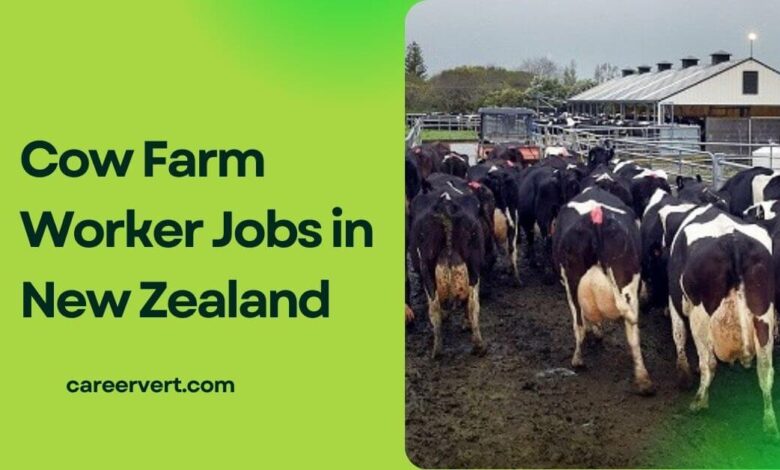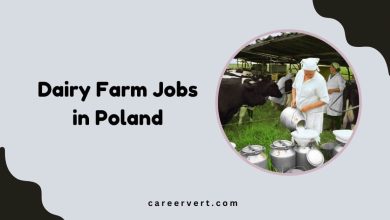Cow Farm Worker Jobs in New Zealand 2024 – Visa Sponsorship

New Zealand is a country that is characterized by a thriving agricultural sector and a serene, tranquil atmosphere. This is appealing to job seekers who are in search of agricultural employment. Cow farm laborer positions are exceedingly distinctive in numerous respects, as evidenced by the numerous job openings.
While serving as a source of positive experiences and increasing the likelihood of international candidates receiving a visa. Please provide additional information regarding the employment opportunities for cattle farm workers in New Zealand.
Check Also: Light Duty Cleaner Jobs in Canada – Visa Sponsorship
Details of Cow Farm Worker Jobs in New Zealand:
- Job Title: Cow Farmworkers
- Job Type: Full-Time
- Visa Sponsorship: Yes
- Country: New Zealand
Requirements of Cow Farm Worker Jobs in New Zealand:
- For that occasion, foreign workers must possess an employment visa to operate in New Zealand. An employer may investigate the feasibility of a sponsored visa for employees who complete the employer’s interview.
- Physical Fitness: The primary responsibilities of cow farm operating are manual labor, which includes bending, hauling, and being outdoors in a variety of weather conditions. Consequently, it is essential to maintain one’s physical condition.
- Basic Education: Although it is not mandatory to possess a formal educational certificate, it is advantageous to have prior experience in animal close-up husbandry and cultivation.
- It is common for employment vacancies to be contingent upon the possession of a valid driver’s license, as it is typically necessary to have a vehicle for travel in rural areas.
Duties of Cow Farm Worker Jobs in New Zealand:
- Animal Care: Establishing a healthful environment that enables cows to consume food and water and seek medical attention as required.
- Milking: I will acquire the knowledge necessary to operate milking machines and ensure the hygiene of the milking parlor. Additionally, it will be my responsibility to guarantee the hygiene of the milk production process.
- Herd Management: The regulation of the delivery process, reproduction, and calving cycles, as well as the welfare of the herd, as necessary. Develop an experience that is both enriching and enjoyable for our customers.
- Pasture Management: The process of managing and maintaining pastures and grasslands through the use of property rotation, fertilization, and pruning.
- Equipment Maintenance: Equipment maintenance is the process of resolving issues that may arise with farm apparatus and equipment to ensure their optimal performance.
Benefits of Cow Farm Worker Jobs:
- Connection with Nature: The experience of working on a cattle farm provides individuals with an opportunity to establish a connection with nature and gain insight into the tempo of rural existence. The tranquil ambiance and intimate engagement with fauna can elicit personal gratification and therapeutic benefits.
- Physical Activity: Cow farm laborers partake in routine physical exercise and enhance their physical well-being through engagement in activities such as feeding, cleaning, and milking cows. This active lifestyle may contribute to fitness and overall health.
- Skill Development: Workers on cow farms acquire practical knowledge and skills in animal husbandry, encompassing tasks such as feeding, grooming, and fundamental veterinary attention. In addition, they gain knowledge of pasture management, farm equipment operation, and other agricultural practices, thereby acquiring transferable skills applicable to other positions.
- Stability of Employment: Agriculture, which includes dairy production, is an essential sector that is less vulnerable to economic fluctuations. Cow farm laborers generally benefit from employment stability and security, given that the manufacturing of milk and other dairy products requires constant labor.
- Sense of Purpose: Engaging in labor on a cattle farm affords individuals a profound sense of purpose and satisfaction, as they actively contribute to the provision of nourishing sustenance for the general populace. Providing for the welfare of animals and tending to their needs can evoke profound personal satisfaction.
- Community Engagement: Cow farm laborers frequently integrate into affluent rural communities, thereby cultivating a feeling of inclusion and companionship. By engaging in community initiatives, agricultural festivals, and local events, they have the opportunity to foster stronger social bonds and connections.
- Diversification of Duties: Contingent on the farm’s requirements and the season, cow farm employees may be engaged in an assortment of tasks, guaranteeing that no two days are identical. This diversity maintains the job’s appeal and enables workers to acquire new abilities and surmount obstacles.
- Opportunities for Progression: Cow farm laborers can potentially attain higher-level positions within the farm or explore related agricultural professions through their diligence and experience. Assuming positions such as livestock manager, farm supervisor, or farm owner-operator entails greater accountability and prospects for leadership development.
- Strong Animal Bonds: Through proximity to cows, farm laborers can cultivate profound emotional connections with the animals entrusted to their care. Establishing connections with intelligent and sociable cows can provide individuals with personal fulfillment and enrichment.
- Support for Sustainable Agriculture: Ethical and environmentally conscious cow farms make a positive contribution to the conservation of the environment and the welfare of animals. Farm laborers who contribute to these endeavors assume a pivotal function in advancing sustainable agriculture and the conscientious management of natural resources.
Salary:
There may be a necessity to establish specific aspects of the salary of cow farm laborers in New Zealand, as it is subject to fluctuations based on factors such as qualifications, skills, and specific responsibilities. Entry-level positions are the most prevalent, with annual salaries typically ranging from NZD 40,000 to NZD 50,000. If the wage is commensurate with the industry’s advancement and experience, it may be increased.
Types of Cow Farm Worker Jobs in New Zealand:
- Herd Manager: Responsible for overseeing the entire spectrum of herd control, including the administration of breeding programs, the health care of animals, and productivity enhancement.
- Milker: operates milking apparatus and adheres to appropriate milking protocols to ensure that milk quality and volume are not compromised.
- Feeder: Prepares and administers the requisite per-head rations to cows to guarantee the maximum absorption of food for production, under nutritional requirements.
- Calf Rearer: Responsible for the care of immature calves, including weaning and health monitoring, until they can join the main herd. This includes the provision of sustenance and water.
- Grazing Manager: Develops and implements rotational grazing strategies, monitors pasture quality, and mitigates seasonal growth fluctuations to optimize output.
- Farm Mechanic: Performs the maintenance and repair of farm equipment in a manner that ensures the apparatus is capable of functioning safely.
- Environmental Compliance Officer: The agricultural methodology adheres to all environmental regulations and minimizes its environmental impact.
- agricultural Hand: Assists with general agricultural tasks, including the maintenance of farm equipment, the construction of fences, and the care of animals, as required.
- AI Technician: employing AI or ET techniques to assist the technicians who oversee the breeding programs or organic enhancement of the herd.
- Dairy Processing Worker: Obtain employment in dairy processing facilities to prepare and package milk products for distribution and repackaging, including pasteurization, bottling, and packaging.
How to Apply for Cow Farm Worker Jobs in New Zealand:
The employment of cow farm laborers in New Zealand provides an opportunity for individuals who have expressed a strong interest in animal husbandry and agriculture and have applied for this position. Visa sponsorship is now available to candidates who meet the qualifications. This enables them to select lucrative professions in this dynamic industry from the comfort of their homes, all while immersing themselves in the rich culture and stunning environment of New Zealand.
Frequently Asked Questions:
-
What are the duties of a Cow Farm Worker in New Zealand?
In New Zealand, cow farm workers are in charge of growing crops, supervising younger farm workers, gathering crops, driving heavy machinery, taking care of animals, keeping an eye on milk production, and keeping farm buildings and equipment in good shape.
-
What is the significance of dairy farming in New Zealand?
New Zealand’s rural economy depends on dairy farming, which makes high-quality dairy goods like milk, cheese, and butter that are sold in the country and around the world. There are jobs in the business, and it makes a big difference in the country’s agricultural sector.
-
How much do farm workers get paid in New Zealand?
The average annual salary for Farm Assistant jobs in New Zealand is between $55,000 and $65,000.



